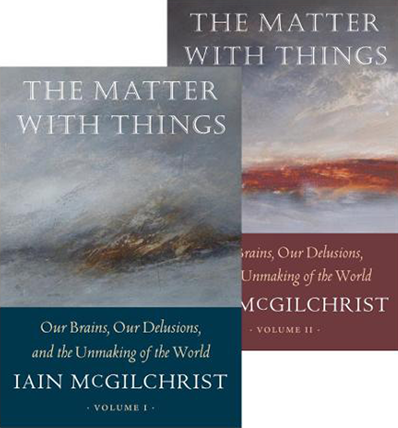
The Matter with Things: Our Brains, Our Delusions, and the Unmaking of the World is the magnum opus of Dr Iain McGilchrist. It spans two volumes, 28 chapters, 8 appendices and a total of 1579 pages. Initially, I did not understand why the author would write such a huge work that very few people will read due to the sheer volume of text. However, having finished it, I believe I understand why he went into such detail.
Ian McGilchrist makes the point over and over again that the right hemisphere is the ‘master’ and that the left hemisphere is the ‘servant’ and that the problem with our current Western world is that the servant has usurped the master. He builds on his previous work The Master and his Emissary and he shows again and again that the left hemisphere focuses on details and is overconfident, thereby missing the big picture (which the right hemisphere is much better at understanding) and the uncertainty that is inherent in life. Reading more than twenty chapters in which this message is proven through referencing the breadth and depth of research leaves no doubt that this thesis is correct. Even my left hemisphere was convinced.
Then, having conclusively proven his point, McGilchrist goes on to leave the detail-focused logical analytical left hemisphere behind and appeals to the reader's right hemisphere to come to grasp (as a ‘Gestalt’) that consciousness is primary, that matter arises from consciousness and that ‘things’ as such do not exist. Everything is in flow, is a process and connected. McGilchrist quotes philosophers and physicists. He appeals to myth and religion as explanation and proof. He concludes that ‘God’ is primary and omnipresent but disagrees that God is omniscient and omnipotent – it is that Nature gets to know herself through a constant process of creation that is neither predictable nor determined. McGilchrist states categorically that he does not believe in an ‘engineering’ God, but something more akin to a life force, which is not restricted to animate matter.
As a rather determined atheist, I struggled with his work – but hear me out. I could feel how my left hemisphere was sneering, while my right hemisphere was listening to the left, but not convinced by it, with the newfound incontrovertible knowledge that the left hemisphere is overconfident and very often wrong. I sat with the ambivalence that the work engendered in me and still am.
What McGilchrist is trying to show us is that we are wrongly limiting ourselves to the left hemispheric reductive way of thinking. Even when we use our overarching right holistic way of making sense of things, we cannot even hope to ever understand life and the universe fully as our brains are far too limited. But at least we can try.
I salute Iain McGilchrist for his courage to write this major work, as I can see how many of our colleagues will summarily dismiss it. I am glad that I read these books and I would recommend that everyone does. I believe that I have learnt a great deal from reading his work and that it will continue to have a positive impact on my life and that the same will be true for you, whether you agree with what he has said or not.






eLetters
No eLetters have been published for this article.